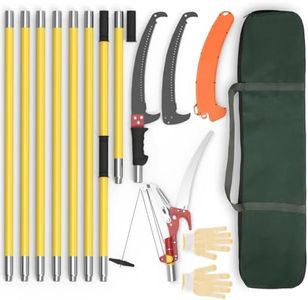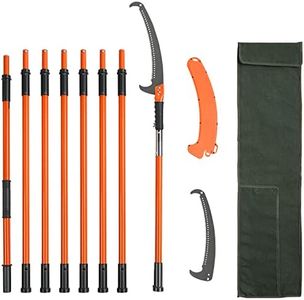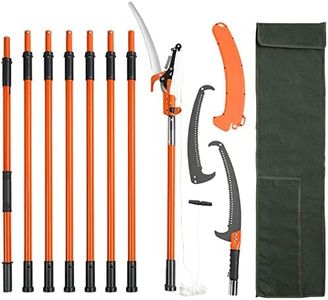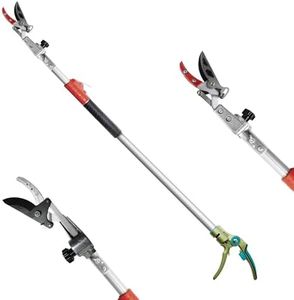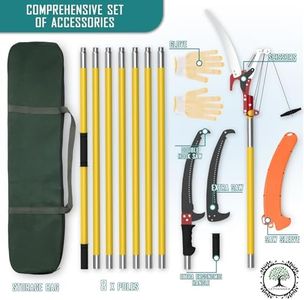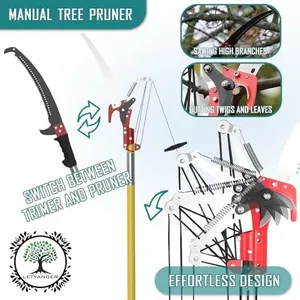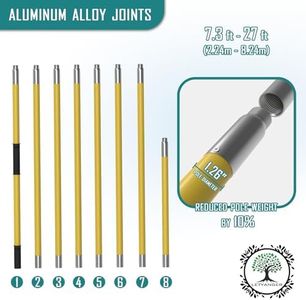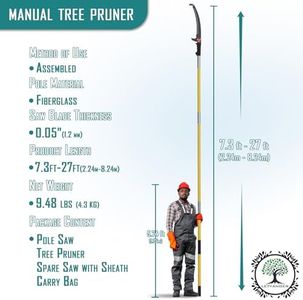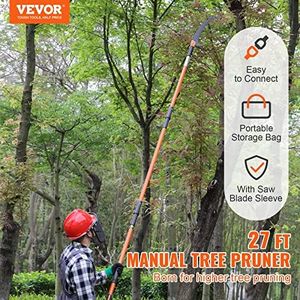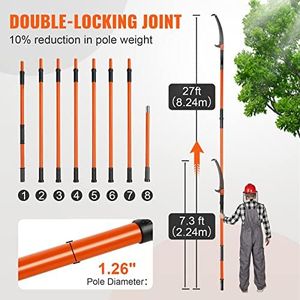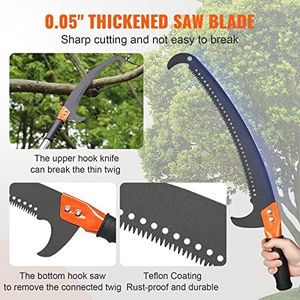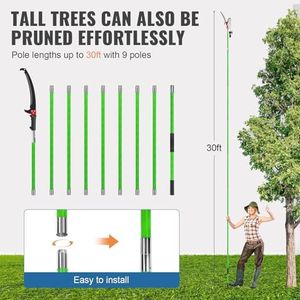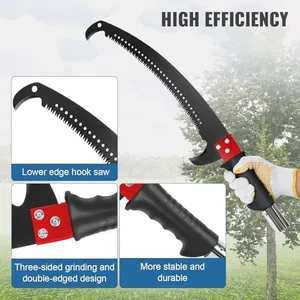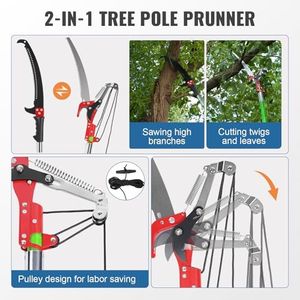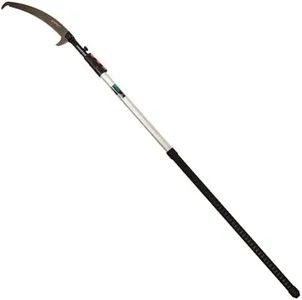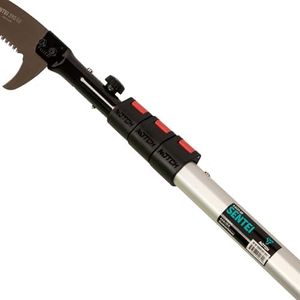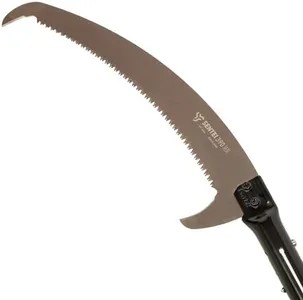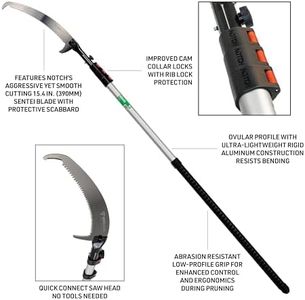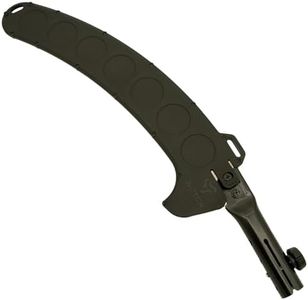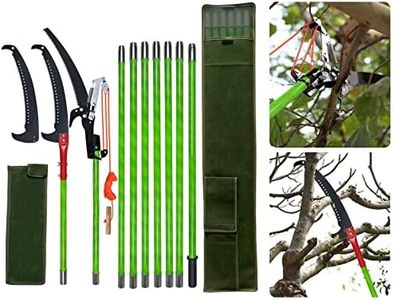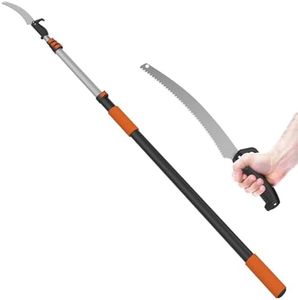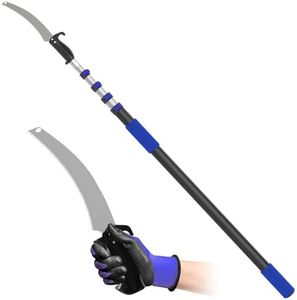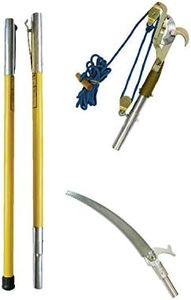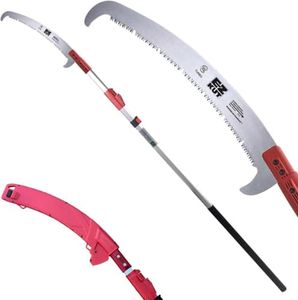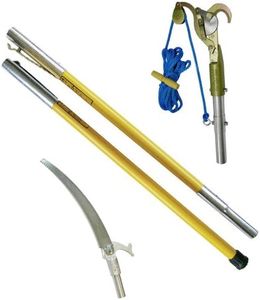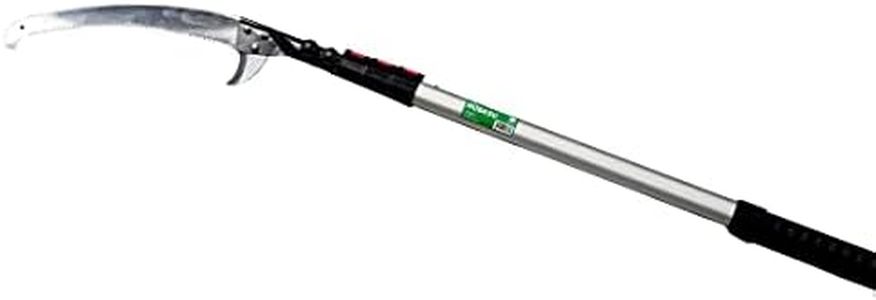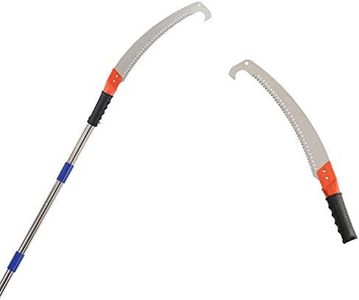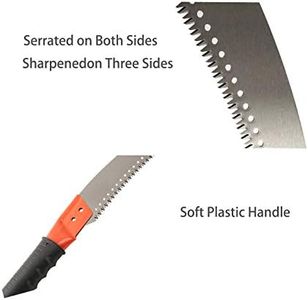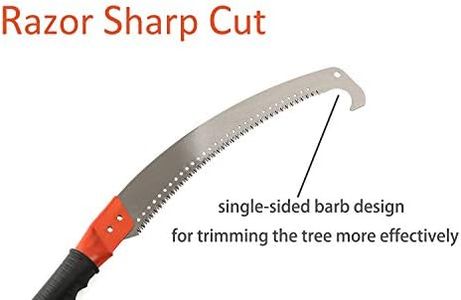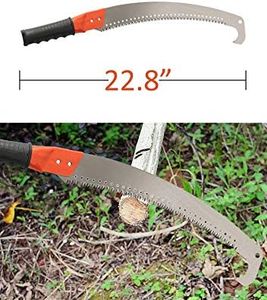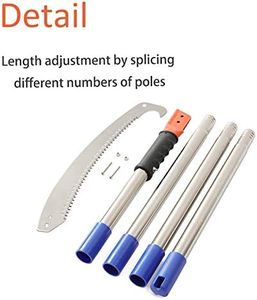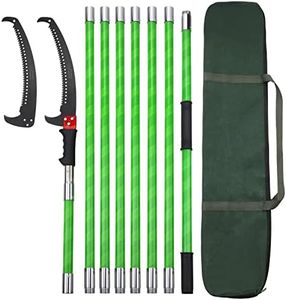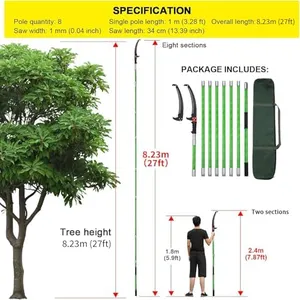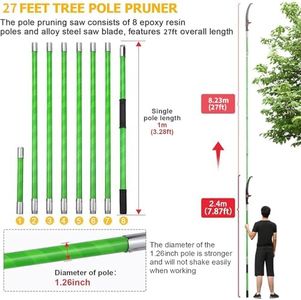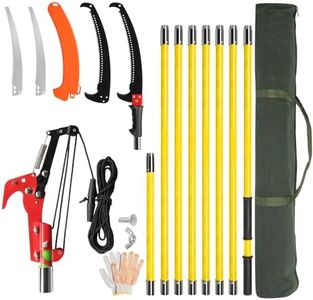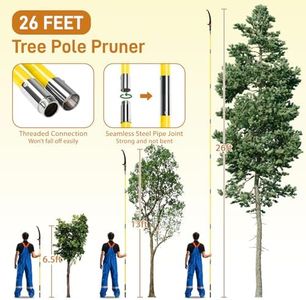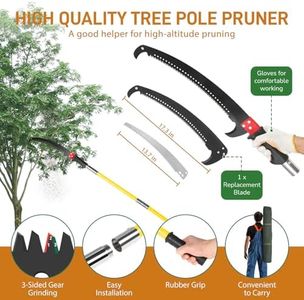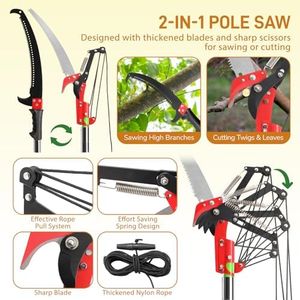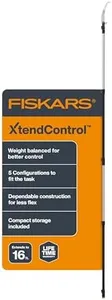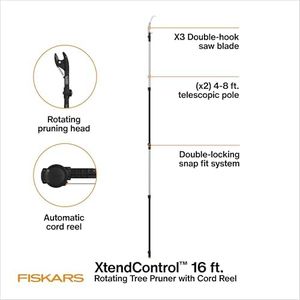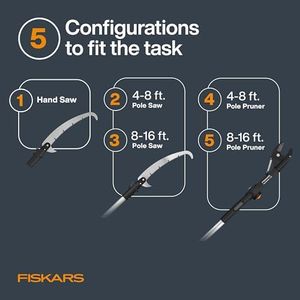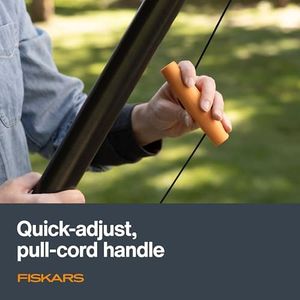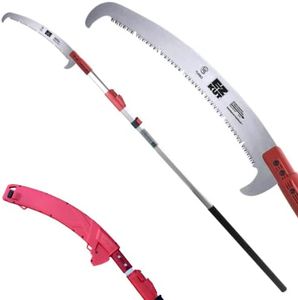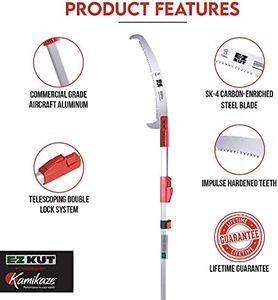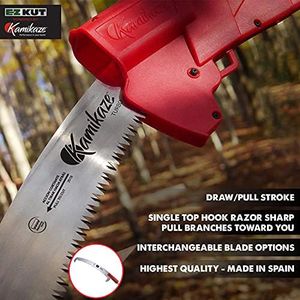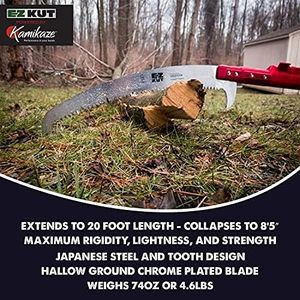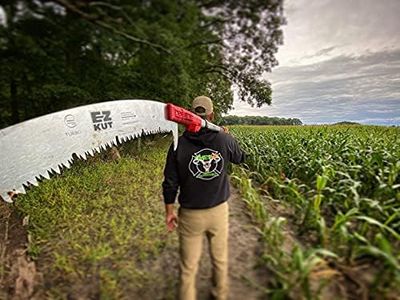10 Best Manual Pole Saws 2025 in the United States
Winner
LETYANGER Pole Saws for Tree Trimming, 7.3-27 ft Extendable Tree Trimmers Long Handle Pruner, Sharp Steel Blade and Scissors High Branches Trimming, Tree Pruner, Tree Saw
The LETYANGER Pole Saw is a manual tool designed for trimming high branches, featuring an extendable pole that ranges from 7.3 to 27 feet, making it versatile for various heights. The package includes 7 poles, a saw and pruner head, an extra saw, and a carry bag, which makes it comprehensive and ready to use. The poles are made from high-quality epoxy resin, connected by aluminum alloy joints, ensuring durability and lightweight handling.
Most important from
268 reviews
VEVOR Manual Pole Saw, 7.3-27 ft Extendable Tree Pruner, Sharp Steel Blade High Branches Trimming, Manual Branch Trimmer with Lightweight 8 Fiberglass Handles, for Pruning Palms and Shrubs
The VEVOR Manual Pole Saw is designed for those needing an effective tool for tree pruning, particularly for high branches. With an impressive extendable length of 7.3 to 27 feet, it caters well to users who want to reach elevated areas without climbing. The saw features a sharp, durable carbon steel blade with a special teflon coating, which enhances its longevity and reduces friction during cutting. This is a significant advantage for users who want a reliable cutting experience without frequent blade replacements.
Most important from
2032 reviews
VEVOR Manual Pole Saw, 7.3-27 ft Extendable Tree Pruner, Sharp Steel Blade and Scissors High Branches Trimming, Branch Trimmer with Lightweight 8 Fiberglass Handles, for Pruning Palms and Shrubs
The VEVOR Manual Pole Saw is a versatile tool designed to help you trim high branches and shrubs without the need for a ladder. Its standout feature is the adjustable pole length, extending from 7.3 feet to a significant 27 feet, which allows you to reach various heights safely. The pole is made of lightweight fiberglass, making it easier to handle than metal alternatives, though at 14.8 pounds, it might feel a bit heavy during long sessions. The blade is crafted from durable alloy steel with a teflon coating to resist rust and stay sharp longer. It includes dual hook knives to help grab and clear branches effectively, enhancing cutting efficiency. The saw’s double-lock design ensures the pole sections stay firmly in place, which adds stability and safety while working. The insulated handle and reinforced connections further reduce the risk of accidents.
Most important from
2032 reviews
Top 10 Best Manual Pole Saws 2025 in the United States
Winner
LETYANGER Pole Saws for Tree Trimming, 7.3-27 ft Extendable Tree Trimmers Long Handle Pruner, Sharp Steel Blade and Scissors High Branches Trimming, Tree Pruner, Tree Saw
LETYANGER Pole Saws for Tree Trimming, 7.3-27 ft Extendable Tree Trimmers Long Handle Pruner, Sharp Steel Blade and Scissors High Branches Trimming, Tree Pruner, Tree Saw
Chosen by 1340 this week
VEVOR Manual Pole Saw, 7.3-27 ft Extendable Tree Pruner, Sharp Steel Blade High Branches Trimming, Manual Branch Trimmer with Lightweight 8 Fiberglass Handles, for Pruning Palms and Shrubs
VEVOR Manual Pole Saw, 7.3-27 ft Extendable Tree Pruner, Sharp Steel Blade High Branches Trimming, Manual Branch Trimmer with Lightweight 8 Fiberglass Handles, for Pruning Palms and Shrubs
VEVOR Manual Pole Saw, 7.3-27 ft Extendable Tree Pruner, Sharp Steel Blade and Scissors High Branches Trimming, Branch Trimmer with Lightweight 8 Fiberglass Handles, for Pruning Palms and Shrubs
VEVOR Manual Pole Saw, 7.3-27 ft Extendable Tree Pruner, Sharp Steel Blade and Scissors High Branches Trimming, Branch Trimmer with Lightweight 8 Fiberglass Handles, for Pruning Palms and Shrubs
30 Ft Manual Pole Saw, Extendable Tree Pruner Blade and Scissors Set with 9 Fiberglass Handles, Long Branch Pruner Retractable for Backyard and Garden, Bush Cutting and Pruning of Palm Trees
30 Ft Manual Pole Saw, Extendable Tree Pruner Blade and Scissors Set with 9 Fiberglass Handles, Long Branch Pruner Retractable for Backyard and Garden, Bush Cutting and Pruning of Palm Trees
Notch 21' Sentei 4 Section Telescoping Aluminum Polesaw (4177-39)
Notch 21' Sentei 4 Section Telescoping Aluminum Polesaw (4177-39)
HOSKO 14FT Pole Saw for Tree Trimming, Long Extension Pruning Saw, Blade Tree Trimmer Pole, Manual Pole Cutter for, Yard Garden and Patios Trees Branches Cutting
HOSKO 14FT Pole Saw for Tree Trimming, Long Extension Pruning Saw, Blade Tree Trimmer Pole, Manual Pole Cutter for, Yard Garden and Patios Trees Branches Cutting
27 Feet Tree Pole Pruner Manual Branches Trimmer Tree Branch Garden Tools Loppers Hand Pole Saws Extendable Height
27 Feet Tree Pole Pruner Manual Branches Trimmer Tree Branch Garden Tools Loppers Hand Pole Saws Extendable Height
Fiskars XtendControl Extendable Tree Pruner (16 ft), Adjustable Branch Trimmer with Rotating Pruning Head, 15" X3 Double-Hooked Saw, 4-8 ft Extension Poles & Automatic Cord Reel for Precision Cutting
Fiskars XtendControl Extendable Tree Pruner (16 ft), Adjustable Branch Trimmer with Rotating Pruning Head, 15" X3 Double-Hooked Saw, 4-8 ft Extension Poles & Automatic Cord Reel for Precision Cutting
EZ Kut Professional Pole Saw 20’ Extendable - Manual Pole Saw for Tree Trimming. Branch Cutter with Double Hook for Branch Removal - Best Tree Pruner. Tree trimmer pole saw. Since 1988
EZ Kut Professional Pole Saw 20’ Extendable - Manual Pole Saw for Tree Trimming. Branch Cutter with Double Hook for Branch Removal - Best Tree Pruner. Tree trimmer pole saw. Since 1988
Recommended lists
Our technology thoroughly searches through the online shopping world, reviewing hundreds of sites. We then process and analyze this information, updating in real-time to bring you the latest top-rated products. This way, you always get the best and most current options available.

